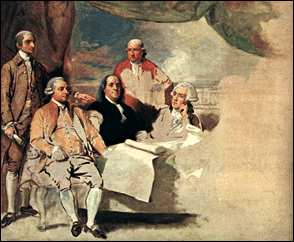![]()
 |
When
Benjamin West began painting the signing of
|
![]()
![]()
![]()
![]()
The staggering news of Cornwallis' disaster at Yorktown reached England in late November, and Lord North received it "as he would have taken a ball in his breast." A war-weary nation called for peace, and Commons declared in March, 1782, that it would consider as enemies to his Majesty and the Country all those who should advise or . . . attempt the further prosecution of offensive war on the Continent of North America." North's ministry fell, and peace commissioners were appointed to both sides.
Washington was not at all sure that Yorktown was the end. "My only aprehension," he wrote, "is lest the late important success, instead of exciting our exertions . . . should produce such a relaxation in the prosecution of the war, as will prolong the calamities of it." But Sir Guy Carleton, replacing Clinton as commanding general in America, proceeded to evacuate the cities of Savannah and Charleston "in consequence of an unsuccessful war."
Through the summer and fall of 1782 peace negotiators labored in Paris. On November 30th, agreement was reached with the American commissioners, and when England came to terms with France and Spain, the formal treaty of peace was signed on September 3, 1783. Eight long, bitter years after a ragged volley was fired on Lexington Green, the war was officially over.
American had won its independence
Paris, the capital of France, has been the site of many important treaty negotiations. The Seven Year's War was concluded by the Treaty of Paris of Feb. 10, 1763, signed by Britain, France, and Spain. France lost to Britain all of its North American possessions (except Louisiana, which it had ceded to Spain); the treaty excluded French troops from Bengal, effectively ending the French imperial drive in India; and, in Africa, France yielded Senegal to the British. The only colonies retained by France were Saint Pierre and Miquelon (in the Gulf of Saint Lawrence); Saint Lucia, Haiti, Guadeloupe, and Martinique (in the West Indies); and Pondichery and Chandernagor (in India). Spain recovered Cuba and the Philippines but ceded Florida to Britain.
If the 1763 treaty was a landmark in the growth of the British Empire, another Treaty of Paris (Sept. 3, 1783) marked Britain's first major colonial loss. By that treaty, which ended the American Revolution, Britain recognized the independence of the United States. The treaty also made navigation of the Mississippi free to all signatories (which included France, Spain, and Holland), restored Florida to Spain and Senegal to France, and gave the United States fishing rights off Newfoundland.
![]()
![]()
![]() So
what is the consequence
then?
So
what is the consequence
then? ![]()